If you’ve just written your first eBook (or are thinking of creating one), you’re most likely looking for a place to sell it. However, with the sheer number of options available, choosing a solution can be overwhelming.
When considering different platforms to sell eBooks, you're likely wondering:
- What does each platform do better than the next?
- Which is the best eBook sales platform for my needs?
Our goal is to help you answer these questions and provide a comprehensive list of the top eBook platforms. We’ve included all the top players, from standard ecommerce platforms to large distributors and dedicated eBook marketplaces, where your book will be exposed to millions of eyes worldwide.
But first, let’s take a step back and consider why someone should want to sell eBooks as their primary (or supplementary) digital product. Or, click to jump ahead to the list of top eBook platforms.
Why Sell eBooks?
Compared to classic print books, eBooks have significantly lower production costs, don’t require you to maintain adequate stock, and are much easier and cheaper to distribute. Therefore, eBooks are a great solution if you want to publish your work and reach a large audience without huge upfront costs.
The eBook market saw a huge boom during the late 2000s and early 2010s. More and more companies released dedicated hardware that allowed bookworms to take their favorite classic, historical, or sci-fi novels on the go.
However, in recent years, eBooks have shifted to more contemporary content, and aspiring writers and entrepreneurs are using them differently.
For example, first-time writers can independently publish their eBooks – this is affordable and attracts a whole new audience to their content. It can even be a great opportunity to explore new genres and ideas.
We’ve also seen young entrepreneurs leverage the power of eBooks to communicate their ideas and tips for success. These entrepreneurial publications are a great way for individuals to establish themselves as a leader in their domain. And on top of all these, selling eBooks can be a great way to earn passive income. EBooks are low-cost to produce, and managing their sales can be done through easy-to-use platforms we’ll discuss below.
15 Best eBook Sales Platforms
Now, let’s get into the list itself. 15 excellent platforms for selling eBooks, each one with its own benefits and drawbacks.
#1 Whop
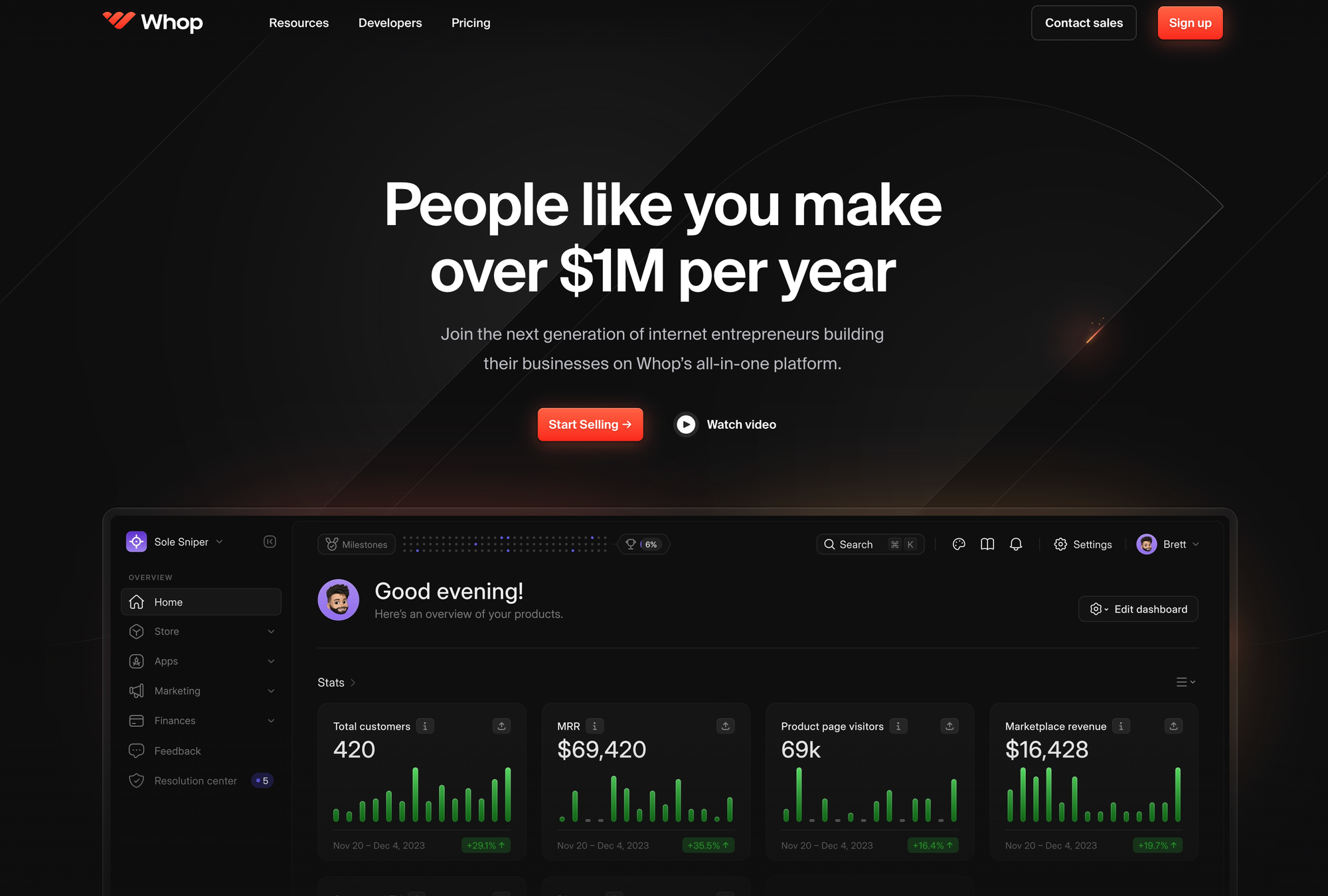
Whop has evolved from a Discord community where people exchanged software, to one of the largest digital marketplaces worldwide. At Whop, you can basically sell anything, from apps and templates to Discord and Telegram memberships and, of course, eBooks. Whop is home to dozens of eBook sellers, including topics such as finance, personal growth, and even fiction novels.
Several up-and-coming entrepreneurs choose Whop for its reliable Marketplace that’s free to enter and comes with industry-leading transaction fees of 3%. If you have an established business with large monthly revenues, you can negotiate an even lower processing fee.
Once your online store is up and running, you can start selling your eBook right away. Whop allows you to offer several digital products, like webinars and courses. For example, you can build a creative writing webinar to complement your fiction eBook. Or, if your eBook focuses on a specific skill, you could pair it up with a video course to enhance its sales potential.
Even if you’re just starting out, Whop will help you grow your eBook business through exposure to millions of people via the Marketplace. And don’t worry about handling and processing orders, as Whop will complete the entire eBook fulfillment process for you. Also, Whop provides a wide assortment of tools and services to help you scale your business to its maximum potential.
Whop places great emphasis on helping e-commerce businesses combat disputes through its Dispute Fighter tool. This feature helps you solidify your case and gives you the best chance to overcome a customer dispute by automatically uploading your legal documents and purchase logs.
Pros:
- Huge marketplace with millions of customers
- Free to sign up and low transaction fees
- Several features and apps for business growth
- Unique Dispute Fighter tool
- Easy-to-use API with 24/7 customer support
Cons:
- Not an exclusive eBook sales platform
Pricing: Whop is free to sign up for and start selling. Transaction fees start at 3% per sale and can go even lower if you have $100,000 in monthly revenue.
#2 Sellfy
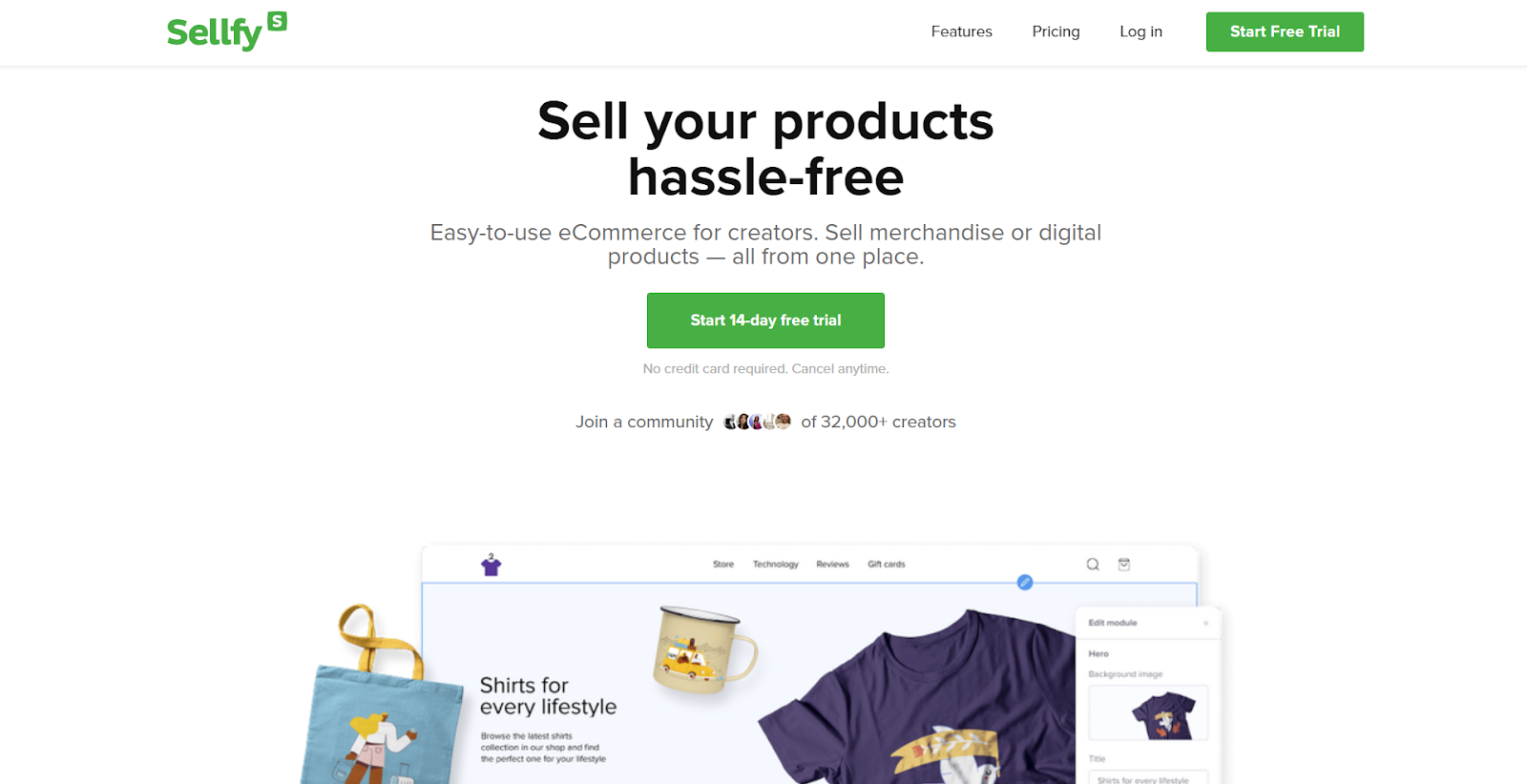
Sellfy has amassed a huge reputation as one of the go-to options for creators looking to sell their digital products (including eBooks) with little to no fuss. Sellfy allows you to create an eBook storefront on the website or integrate the platform into your website.
Apart from eBooks and other digital products, Sellfy gives you the option to sell physical products, such as POD (Print-On-Demand) items and merchandise. Sellfy also has a few marketing tools available, including its own analytics tool, promotions and discount codes through emails, and social media pixels to track any campaigns you want to run.
The icing on the cake for Sellfy is the zero fees it charges for all transactions. However, the platform lacks free entry, and you need to pay a fixed subscription rate, depending on the size of your business. Thus, the processing fees are essentially incorporated into the subscription fee.
Pros:
- Simple process to create your online store
- No fees on all transactions across all pricing plans
- Easy-to-customize store, can be incorporated into your own website
- Several marketing tools through email and social media
Cons:
- Mandatory subscription with no free access
- Maximum revenue cap of $200K, limiting growth potential
Pricing: Sellfy has three different plans according to your business's annual revenue. We've calculated the effective transaction fee percentages based on the maximum amount you can earn per year on each plan. These prices refer to monthly plans.
- $29 a month with up to $10K in sales every year (effective 3.50% in transaction fees)
- $79 a month with up to $50K in sales every year (effective 1.90% in transaction fees)
- $159 a month with up to $200K in sales every year (effective 0.95% in transaction fees)
#3 Podia
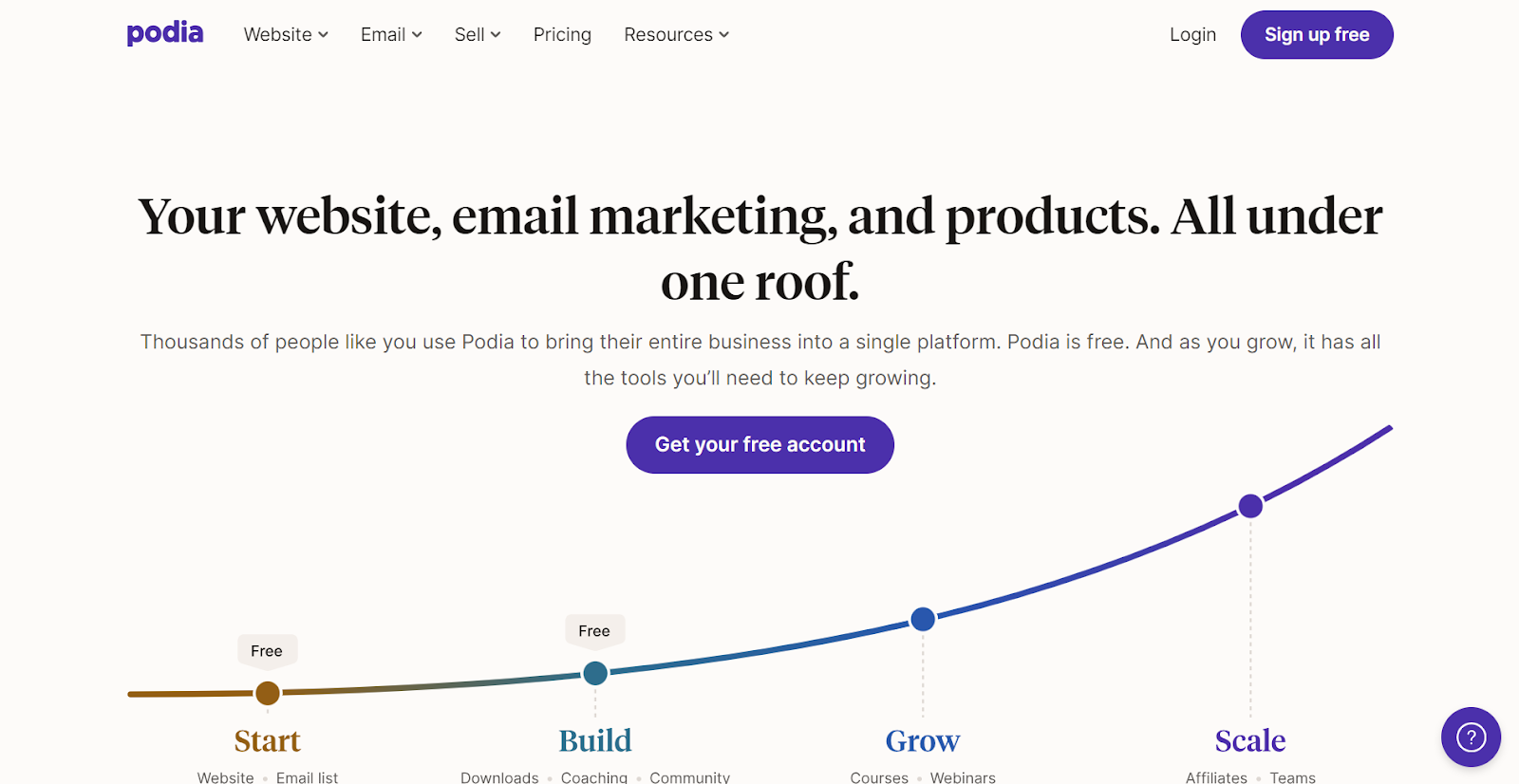
Podia is another excellent ecommerce platform for all types of creators, including eBook authors. Its account creation process is one of the simplest out there, and you can very easily create your online store and set it up however you like through multiple templates.
As soon as your store is ready, you can begin to sell your eBook immediately. Like Whop, Podia also allows you to sell additional products, including webinars and courses. For instance, you can build a creative writing webinar to accompany your fiction eBook. Or, if your eBook teaches a particular skill, you can pair it with a video course to help boost its sales.
One noteworthy advantage of Podia is the Community feature, which can help create a tightly-knit group around your ebook and act as an online book club. You can utilize Podia's vast selection of marketing tools to grow your Community, including email marketing campaigns and Facebook and Pinterest pixels. Once you have a fully-fledged Community, you can employ the built-in affiliate program to scale your business even more.
Pros:
- Wide variety of digital products to sell, including eBooks, courses, and webinars
- Easy-to-setup online store with several attractive templates to choose from
- Special Community feature that helps you grow and scale your business
- Flexible payment plans with low transaction fees
Cons:
- Free plan comes with a steep 10% in transaction fees
- Email marketing comes as an optional add-on
Pricing: Podia has several different payment plans, including a free membership that comes with 10% in fees and only allows you to upload one eBook and one coaching product. Also, yearly subscriptions come with large discounts compared to monthly ones. Still, the transaction fees are still pretty high, only going down to 0% when you opt for the Shaker plan:
- Starter plan for $9 a month and 8% in fees
- Mover plan for $39 a month and 5% in fees
- Shaker plan for $89 a month and zero fees
#4 Shopify

As a leading ecommerce platform, Shopify also makes for a good eBook selling platform. You can begin by creating and customizing your storefront to fit your style and start selling immediately. Just keep in mind some premium features are locked behind a paywall.
Once you’re ready to take the next step and release more eBooks (or any other digital or physical product, for that matter), Shopify will be there to help. You can also make your store more user-friendly or add more functions through several plugins found on the Shopify app.
In terms of marketing, Shopify supports all mainstream tools you’ll need. You can link your business’s social media accounts and create SEO-friendly listings to attract new customers. There’s also a built-in email marketing tool (or you can use any third-party tool) and advanced analytics you can access in your dashboard.
Pros:
- Massive ecommerce platform with a worldwide reputation
- Simple to create an eBook store and scale up as it grows
- Mobile-friendly stores to help with device accessibility
- Several marketing tools to promote and grow your store
Cons:
- Transaction fees if you don’t use Shopify’s gateway
- Expensive subscription plans, with the advanced plan costing $399 a month plus transaction fees of 2.4%
Pricing: Shopify offers three payment plans, all of which start with a free trial and an initial 3-month cost of $1. After that, you can choose to continue paying month-to-month or opt for the annual package, which will give you a discount, but is still a significant fee when compared to other platforms.
- Basic plan for $39/month and card rates starting at 2.9% + $0.30
- Shopify plan for $105/month and card rates starting at 2.6% + $0.30
- Advanced plan for $399/month and card rates starting at 2.4% + $0.30
#5 Payhip
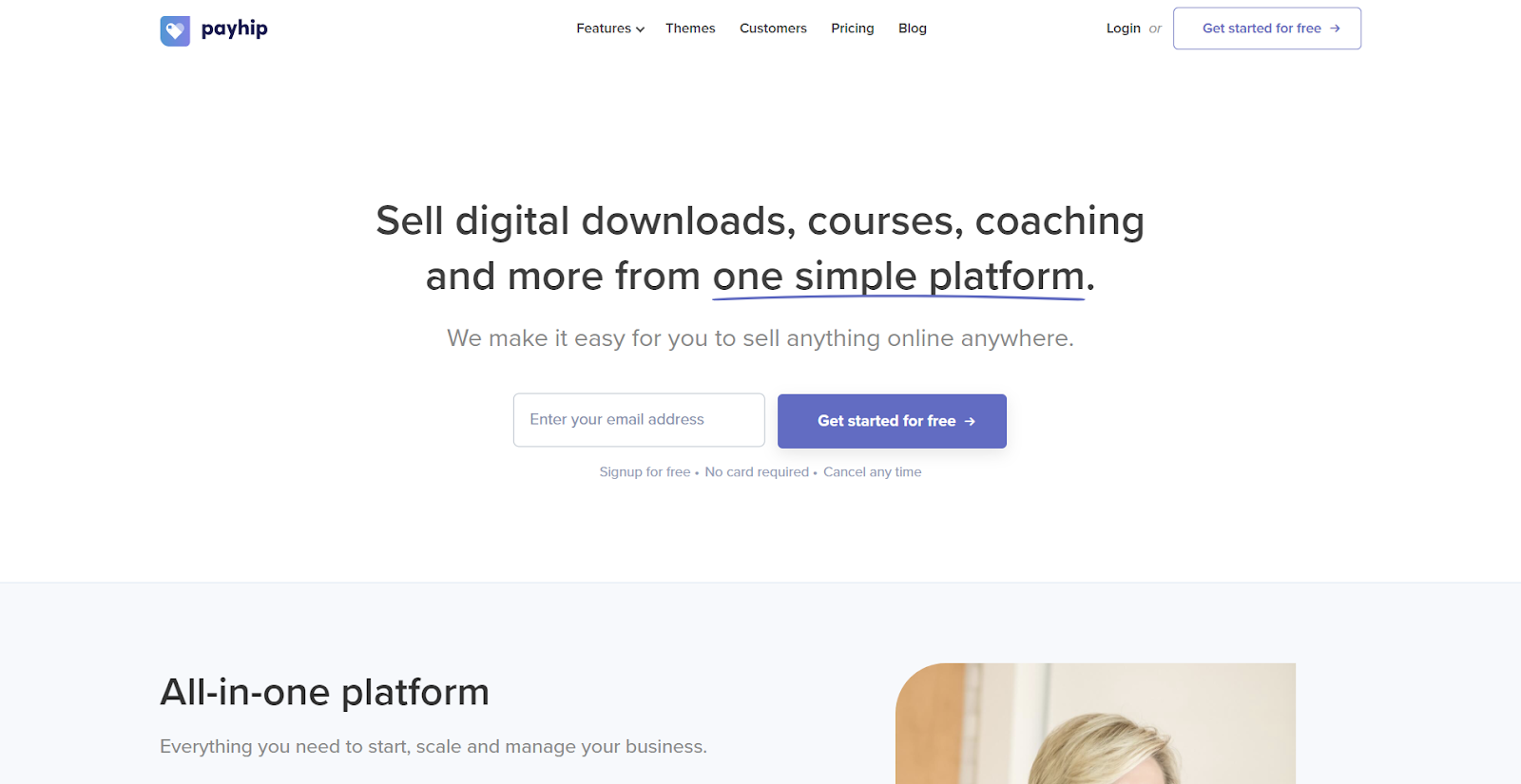
While seemingly simplistic at first sight, Payhip is a good option for beginner writers to sell their first eBooks. A no-nonsense platform that’s easy to sign up for and comes with some pretty attractive presets for your online store.
You have all your usual features, including PayPal and Stripe integration and great compatibility with several major email marketing tools (unfortunately, you don’t get a built-in one, though). The platform also offers a few nifty marketing tools you won’t find on most competitors.
You can create custom coupons and discount codes and push for upsells and cross-sells seamlessly. There are also affiliate and referral systems to drastically boost new customer recruitment. The best part is that the entire platform comes with very low transaction fees that can even reach zero with the right plan.
Pros:
- Excellent platform for novice writers and entrepreneurs
- Painless process to create and run your store
- Helpful marketing tools, like cross-sells, upsells, and coupons
- Low transaction fees (depending on the plan you choose)
Cons:
- Lacks a built-in email marketing tool
- Doesn’t have advanced features for scaling
Pricing: Payhip gives the option of 3 payment plans, each with its own transaction fee percentage. Remember, you can always sign up for free, and there are no additional discounts for committing long-term.
- Forever Free for $0 a month and a fixed 5% in transaction fees
- Plus for $29 a month and a fixed 2% in transaction fees
- Pro for $99 a month and 0% in transaction fees
#6 PublishDrive
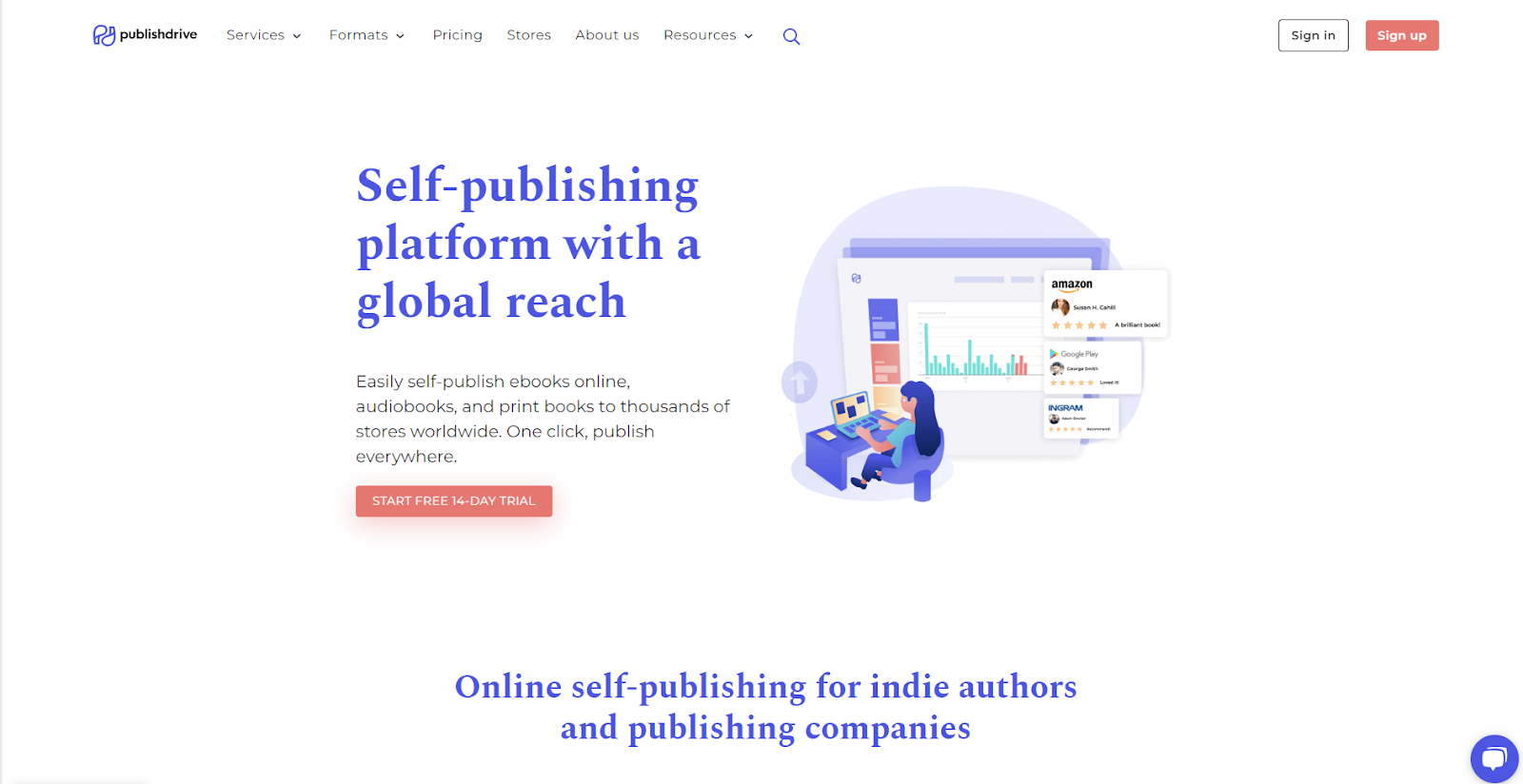
PublishDrive is quite different from the platforms we’ve looked at so far, as it’s a dedicated eBook distributor and not an ecommerce platform. The key is that you’re not selling your eBooks directly to PublishDrive. Instead, you utilize their distribution system to get them straight into large stores and marketplaces.
With PublishDrive, you can self-publish eBooks, audiobooks, and even physical prints. And instead of having to list them on each platform, PublishDrive will do it for you and even give you 100% of your earnings.
And it’s not just a distribution platform either. PublishDrive offers unique management tools to help you, as an author, coordinate with your publishers or assistants through a shared account. Plus, you can utilize the platform’s marketing tools, including promotional prices, ads, and free review copies.
Pros:
- Dedicated distributor for eBooks, audiobooks, and print books
- Access to a global network of thousands of bookstores and libraries
- Flat pay rate plans with 100% royalties retained
- In-depth marketing tools to help increase your sales
Cons:
- Mandatory subscription to use the service
- Platform can feel complicated for someone just starting out
Pricing: Based on your business's size and book catalog, you can choose one of four PublishDrive payment plans. They all come with a 2-week free trial and 0% revenue retained.
- Starter plan for $16.99 a month and 1 book title
- Standard plan for $24.99 a month and 6 book titles
- Plus plan for $49.99 a month and 18 book titles
- Pro plan for $99.99 a month and 48 book titles
#7 Amazon Kindle Direct Publishing
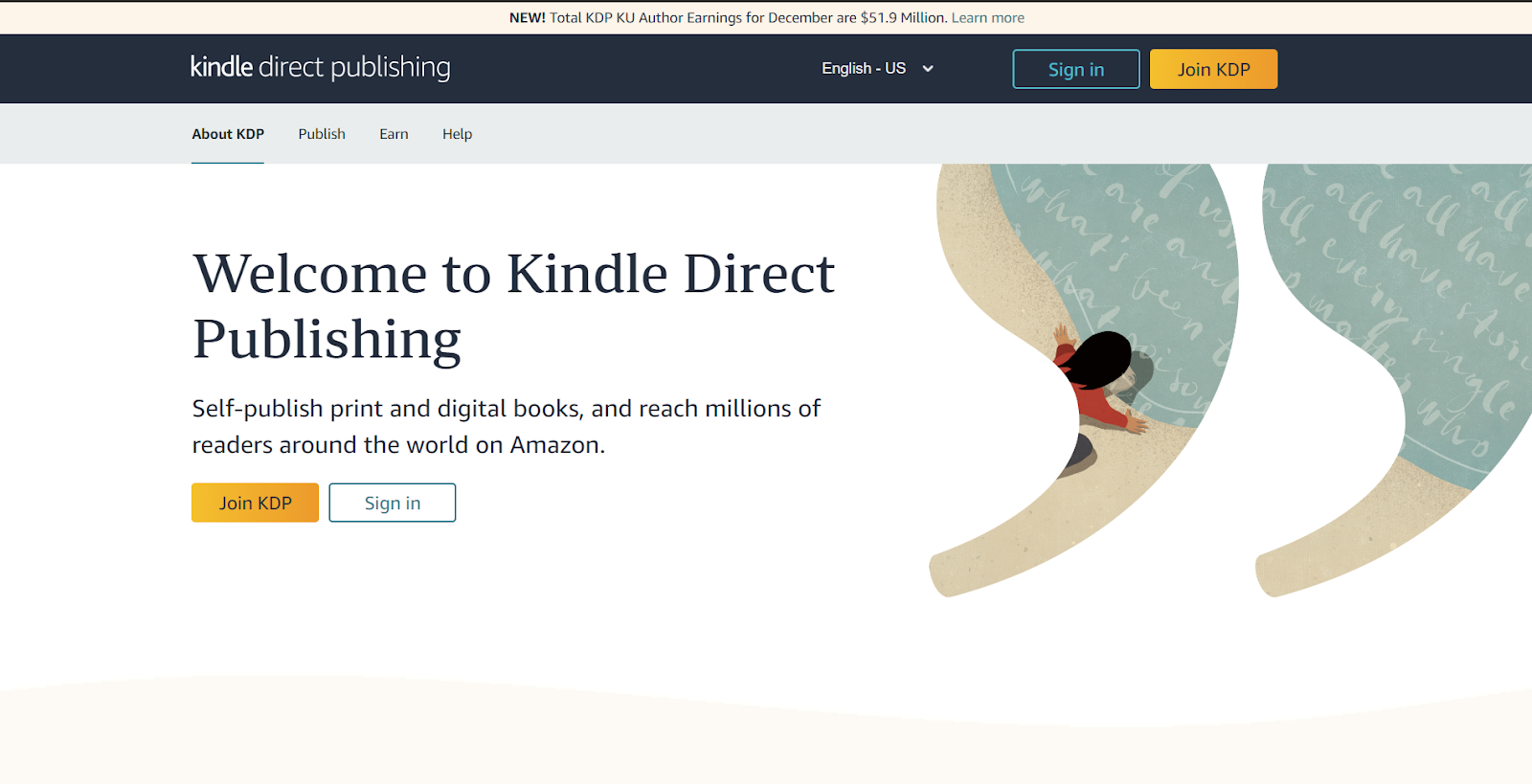
Now, we move on to the king of online book marketplaces, Amazon. Amazon, with its Kindle Direct Partnership (KDP) program, allows you to take your first steps in self-publishing and list your eBook on the platform for free.
The caveat is you only get a percentage of royalties (35% to 70%) depending on how much your eBook costs. So, you could earn a mere 35% of the money brought in by your own hard work, with the other 65% going to the platform itself. You don’t need to manage an online store, though, as Amazon will basically do the work for you.
The obvious benefit of choosing Amazon is exposure to millions of readers worldwide. You’ll be hard-pressed to find a platform with such a high customer base, but you shouldn’t just rely on it exclusively. Still, it’s a great place to get tons of visibility and real-world feedback on your publishings.
If you want to maintain exclusivity (at least for a short time), enrolling in the Kindle Select program is a good idea. This will lock your eBook on Amazon exclusively for 90 days and will include it in Kindle promotional campaigns and services like Kindle Unlimited.
Pros:
- Exposure to a massive worldwide market of potential readers
- Easy to set up and manage your account
- Publish your books for free
- Print-on-demand service for paperback books
Cons:
- Harsh structure of royalties, which limits growth
- Additional services, like Kindle Unlimited, require exclusivity
Pricing: Amazon doesn’t require any subscription but only gives you a percentage of your revenue depending on your eBook’s price:
- 70% royalties on eBooks between $2.99 and $9.99 + $0.15 for every MB of file size
- 35% royalties on eBooks below $2.99 or above $9.99 and Kindle Select books up to 100 pages
#8 SendOwl
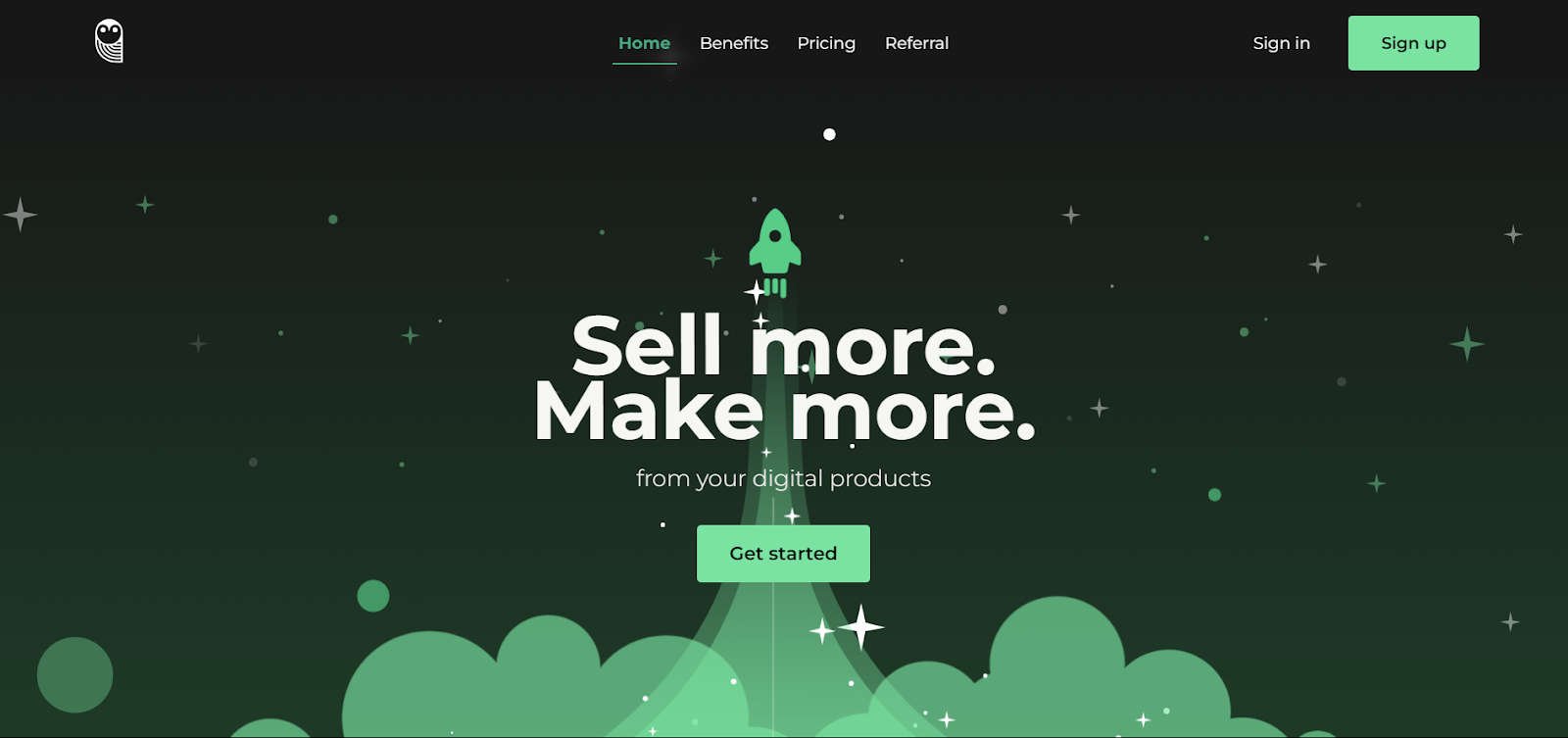
SendOwl offers a unique proposition for eBook authors who already have an established online presence and want a quick and easy checkout solution. Once you put your eBook (or any other digital product) on SendOwl, you can create a checkout link or a sales page with more information on your product.
SendOwl will take care of the entire checkout process. It integrates two major payment gateways (Stripe and Paypal) and will send out unique download links to buyers to limit content duplication.
One unique feature of SendOwl that caters to eBook authors is the Drip feature. This allows you to automatically send your content out on a chapter-by-chapter basis, which can help create hype around it. SendOwl also has other standard marketing and analytics tools, as well as seamless cross-sells and upsells.
Pros:
- Flexible service that allows for promoting content wherever you want
- Drip feature for gradual content release
- Security measures to avoid unauthorized content distribution
- Seamless integration with multiple apps
Cons:
- Doesn’t allow you to create an entire website
- Advanced features are complicated
- You need to already have an established online presence
Pricing: SendOwl supports three unique payment plans, all of which come with unlimited products and the number of sales. There’s also a free trial of 14 days when you start out.
- Starter plan for $9 a month (free for the first 3 months) with 10GB of storage and 5% on all transactions (minimum $0.50)
- Growth plan for $15 a month with 100GB of storage and $0.33 on all transactions
- Pro plan for $39 a month with 200GB of storage and $0.17 on all transactions
#9 Apple Books for Authors

With Apple being one of the leading tech ecosystems, selling your eBook on the Apple Books for Authors service will ensure visibility from millions of users. The platform is very simple to operate and will guide you in every step of the publishing process.
Your eBooks will be released in EPUB, arguably the most popular format in the market, and be accessible on all Apple devices, which will increase your potential customers. You’ll also receive royalties of 70% regardless of the price of your book, and it doesn’t require any file delivery fees.
One downside of Apple Books is it’s not a full-on ecommerce platform, which means it lacks some essential marketing and analytics tools. However, you can still monitor your book sales, adjust prices, and participate in Apple’s promotional campaigns to boost visibility.
Pros:
- Access to worldwide market with millions of users
- Simple platforms with easy publishing process
- Users can access eBooks across different devices
Cons:
- Lacks advanced marketing and analytics tools
- Highly competitive market makes it difficult to stand out
- Enclosed ecosystem can limit potential growth
Pricing: Apple Books for Authors doesn’t require any subscription and allows you to publish eBooks for free. Your compensation will be 70% of every sale no matter the price of your eBook.
#10 Kobo Writing Life

Kobo Writing Life is one of the oldest self-publishing platforms for eBooks, dating all the way back to 2012. It’s still one of the best ways to sell your eBooks, thanks to Rakuten Kobo’s worldwide distribution network that includes large retailers and even libraries.
The Kobo Writing Life platform is very intuitive to use, and publishing your eBook only requires a few simple steps. You can customize every aspect of it, including its price in different regions, which gives you great flexibility, especially considering Kobo’s variable royalty rates.
In terms of marketing, Kobo doesn’t have an extensive toolkit available, but you can still track your sales effectively through the in-depth analytics tools. Another recently added feature is the Kobo Plus program, a reader subscription plan that can help boost your visibility drastically if you choose to enroll your eBook on it.
Pros:
- Self-publishing platform with a wide distribution network in over 200 countries
- Access to major retailers and libraries through Overdrive
- Flexible eBook pricing depending on which region you sell
Cons:
- Not the largest market share compared to other similar platforms
- Caters to specific regions of the world with smaller audiences
- Lack of important marketing tools
Pricing: Kobo Writing Life doesn’t come with a mandatory subscription, and you can just publish and sell your eBooks for free. Depending on their list price, you’ll earn the following royalties:
- 70% for eBooks that cost $2.99 or more (minimum price varies by region)
- 45% for eBooks that cost below $2.99 (minimum price varies by region)
- 20% for public domain eBooks
#11 Google Play Books Partner Center
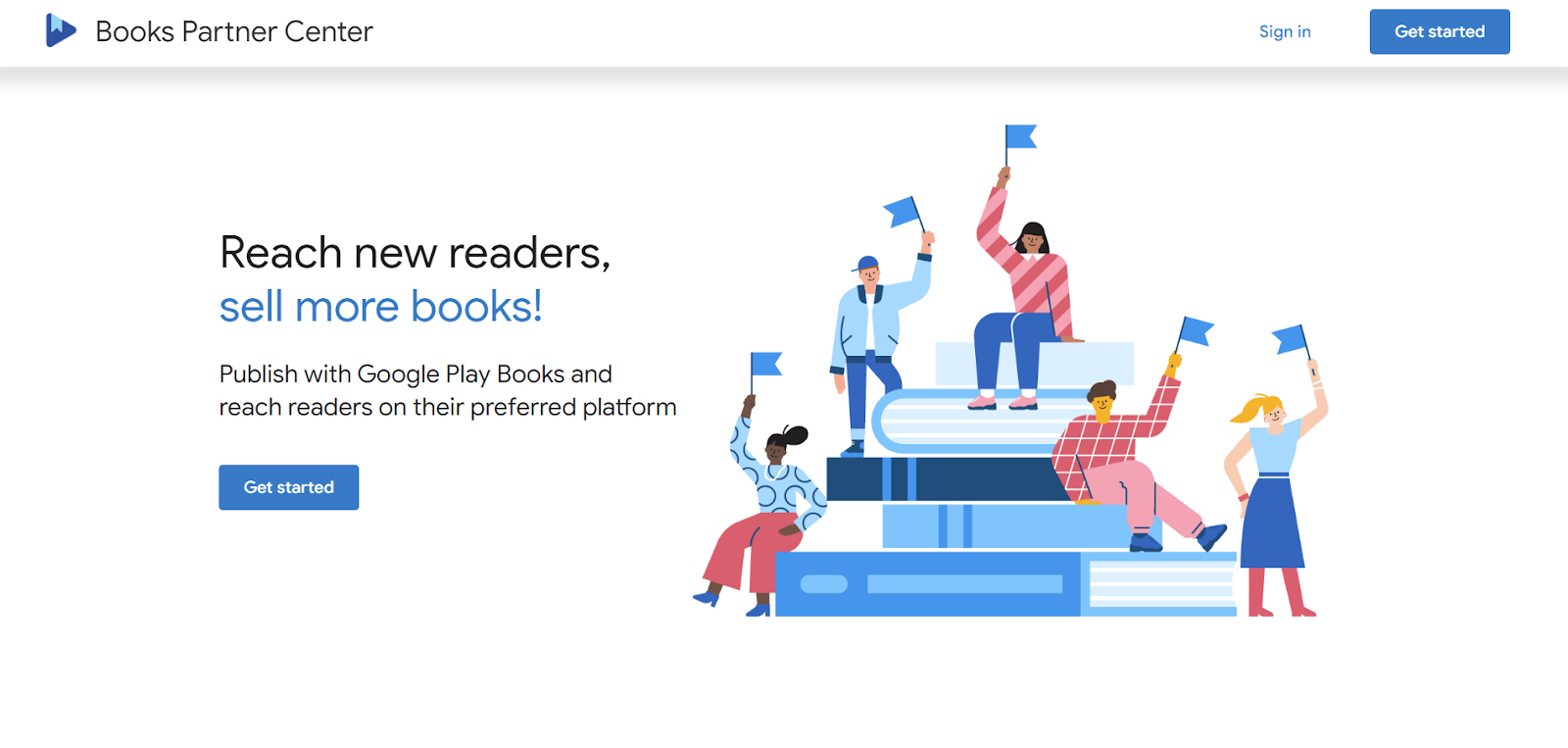
Google Play is undoubtedly the largest app store in the world, and selling your eBook on Google Play Books will maximize its visibility. Plus, Google doesn’t even require any exclusive rights to your content, which means you can also list it on any other platform you want.
All you need to sell your eBooks on Google Play Books is to become a Books Partner and follow a simple process to upload your file. Then, you can choose your pricing and the countries you want to sell your book in. You can also maintain a flexible price and even offer your book for free.
Apart from personalized recommendations that may help you attract new readers, Google Play Books has no other marketing tools. But you can freely promote your work however you want and create promo codes to help with advertising.
Pros:
- Huge market with billions of daily users
- No exclusivity required to publish and sell
- Easy to access books online and offline on several devices
Cons:
- Lack of any concrete marketing tools
- Sales revenue not uniform across all countries
- Difficult for your eBook to stand out
Pricing: Google requires no membership to publish your work on Google Play Books. You’ll get 70% of every sale of your eBook, regardless of its price, in over 60 countries worldwide, while in some countries, you’ll be limited to 52%.
#12 IngramSpark
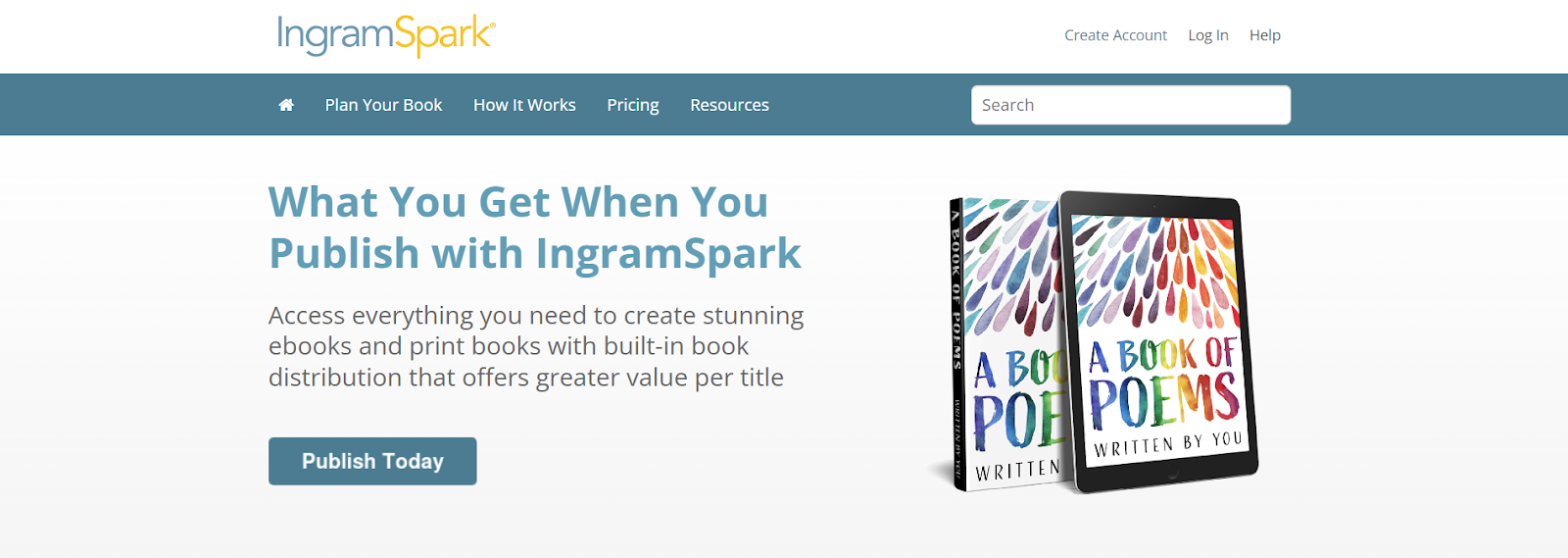
IngramSpark is the self-publishing branch of one of the largest book distribution platforms, Ingram Content Group. Although the platform specializes in print-on-demand books, you can still publish and sell your eBook, taking advantage of its global reach.
In fact, the vast distribution network makes IngramSpark so appealing to eBook authors. It includes all major online retailers and a huge number of libraries worldwide. Your eBook will basically be everywhere, and you’ll get the highest exposure possible, which should convert to increased sales.
IngramSpark recently cut all setup fees for both physical books and eBooks. This means you can publish your eBook with no upfront costs, and you’ll also get a 60-day window where you can make revisions before it’s released.
Pros:
- Largest distribution network in the world
- Access to large online retailers and marketplaces for maximum visibility
- Free eBook setup and free revisions for 60 days
Cons:
- Platform has a steep learning curve
- Marketing tools are lackluster
- Sales reports sometimes feel clunky
Pricing: IngramSpark doesn’t charge any fees for publishing your eBook, but it does charge 1% of the local list price for global distribution. In terms of royalties, you’ll get 70% of your sales in most countries.
#13 Barnes & Noble Press

Just as the name Barnes & Noble should be familiar to any book lover, the Barnes & Noble Press service should ring a bell to any aspiring eBook author. Barnes & Noble Press is a self-publishing platform that allows you to release your work in eBook format and sell it on the Barnes & Noble network, including its retail collaborations like Walmart.
Once you create your Barnes & Noble Press account, publishing your eBook should only take a few minutes, and it will become available within 72 hours. The platform will constantly deliver your sales reports and give you useful tips and tricks to help boost your revenue.
B&N Press doesn’t really offer any marketing tools apart from the platform’s own promotional campaigns. Instead, they’ve partnered up with several renowned third-party apps to help writers in aspects like design, marketing, editing, and even audiobook recordings.
Pros:
- Prominent eBook platform with a huge audience
- Gives you the option to publish eBooks and POD books
- No exclusivity necessary to publish on the platform
Cons:
- Not the best for international sales
- Limited built-in marketing tools
- You can’t publish audiobooks on the platform
Pricing: Barnes & Noble Press follows a very simple pricing structure, where publishing your eBooks is free, and you get 70% royalty regardless of your list price.
#14 Lulu
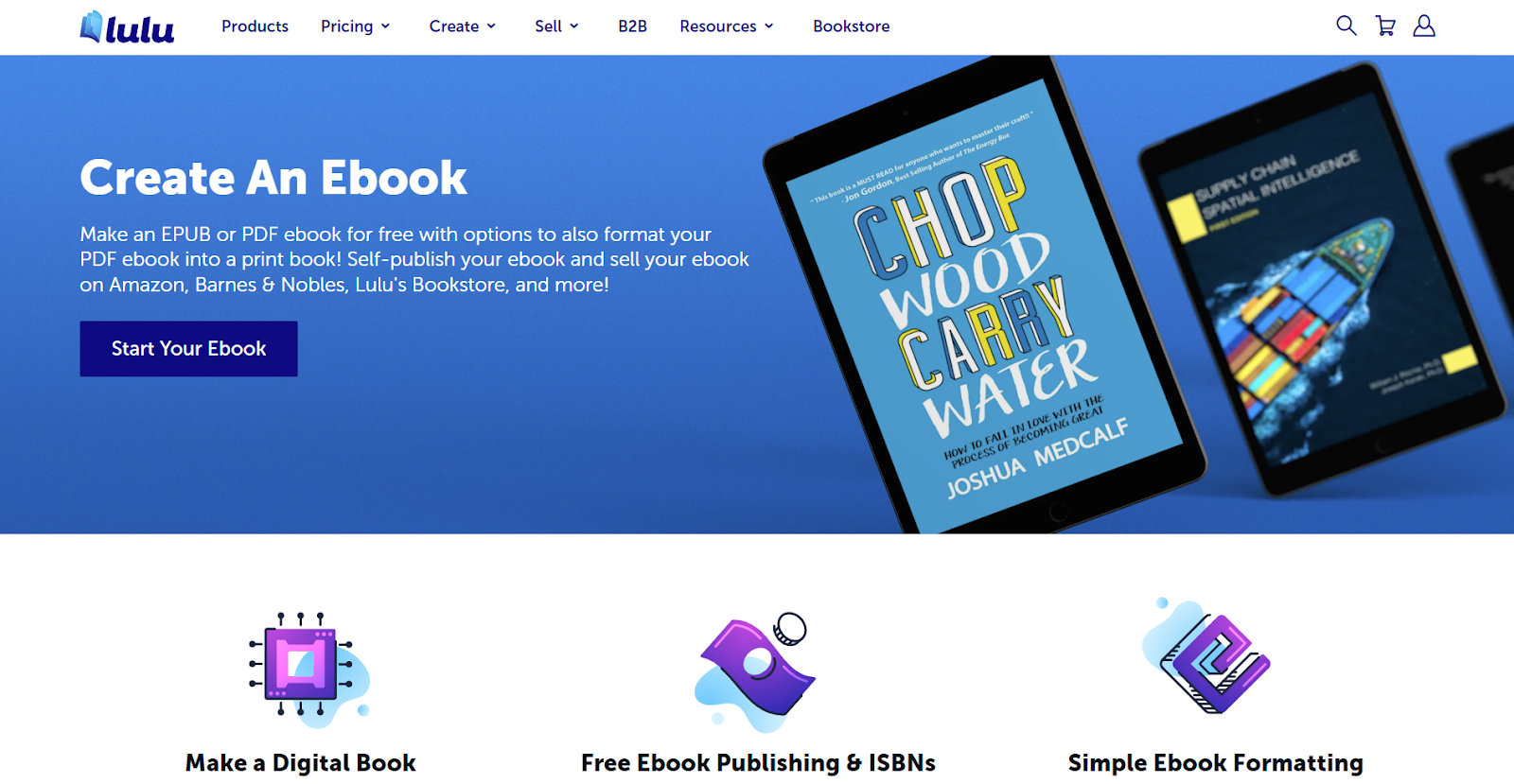
Lulu has been serving aspiring authors as one of the go-to self-publishing platforms for over two decades. With Lulu, you get a complete solution that will take your eBook manuscript, format and convert it, and then distribute it through its large network of online marketplaces. Plus, Lulu has its own bookstore for indie writers, which means even more visibility for your work.
You can create your own Lulu storefront, but it’s generally advised to promote your work elsewhere and send customers to Lulu to purchase your eBooks. When you publish on Lulu, you choose how you want to distribute your eBook and adjust pricing for each region to ensure you get the most out of royalties.
On top of being a reliable eBook selling platform, Lulu also has little to no upfront costs, which makes it ideal for newcomers who don’t have a huge budget. You only need to pay if you want your program to be distributed through the platform’s worldwide network of 40K+ retailers and libraries.
Pros:
- All-in-one self-publishing platform ideal for new writers
- Wide network of popular retailers, including the Lulu bookstore
- Unique Self Publishing Hub to discuss with fellow authors
Cons:
- Some of the platform’s technical options can feel complicated
- Lackluster customer support for authors
- Global reach not as extensive as other platforms
Pricing: Publishing your eBook on Lulu is free, but you’ll need to pay a one-time fee of $4.99 for Global Distribution. In terms of royalties, you’ll get a generous 90% revenue share for eBook sales both on the Lulu bookstore and through Global Distribution.
#15 Draft2Digital
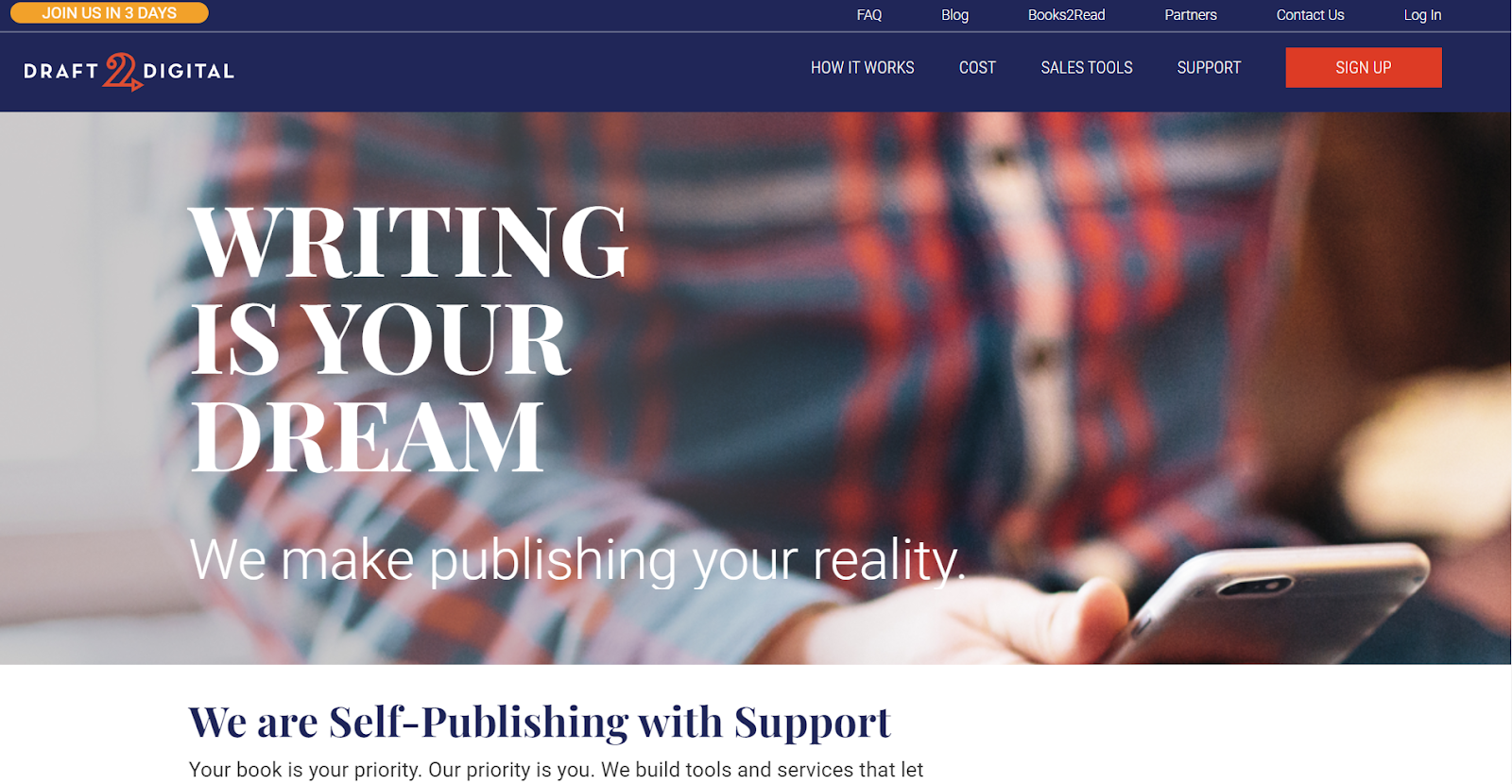
Last but not least, we have Draft2Digital, a renowned self-publishing and distribution platform that will help get your eBook out to as many people as possible. Through its wide network, Draft2Digital can help sell your book on every major platform, including the popular Smashbooks store that D2D recently acquired.
If you want to sell your eBook with Draft2Digital, you’ll need to sign up for a free account and complete the publishing process. D2D provides plenty of tools to help with formatting if your work is not 100% ready to go live. You can choose among which platforms you want to distribute your books, as well as whether you want them in libraries or not.
Apart from selling your eBook, D2D has a few unique tools to help with marketing your work. You can create your own Author Page and have a Universal Book Link (UBL) to send your customers to that page showcasing your work. If you want to promote a specific eBook, you can build a standalone Book Tab, which will contain some important information about it.
Pros:
- Worldwide distributor with access to many major online retailers
- eBooks are free to publish, and you get a large revenue share
- Several tools for marketing and advertising your eBooks
Cons:
- Not as wide international network
- Limited promotion on new author releases
- Formatting tool can sometimes feel clunky
Pricing: Draft2Digital doesn’t require any subscription or fee to publish your eBook. For every sale you make, the platform takes a 10% aggregator cut for its services.
What to Look For in an eBook Platform
So, how can you choose which platform to sell your eBook on? There are several aspects to consider, depending on what you want from your eBook selling platform. We believe the following are key factors to look for when picking your preferred platform:
- Marketplace - EBooks and other digital products can benefit tremendously from the exposure that a large marketplace offers. When someone’s looking for a specific product, they’re more likely to visit a particular marketplace they know and search for offerings there instead of checking out the websites of individual sellers.
- Low Fees - When you try to sell your eBook online, the last thing you want is to lose a ton of revenue to transaction fees and subscription costs. So, you need to look for a platform that offers low fees to maximize your income and potentially lower your eBook price to make it more appealing.
- Active Audience - A digital product marketplace is nothing without an active number of people checking it out every day. You should choose platforms with high traffic numbers to ensure your eBook gets the most exposure possible, translating to more sales.
- Marketing - The final piece of the puzzle is a bunch of good marketing tools. Regardless of how many customers view and buy your eBook, you can always reach even more through clever marketing. And your platform should provide several tools to assist you in promoting your eBook and securing more customers.
With all these aspects in mind, Whop is on the top of our list as it ticks all these boxes. The Whop Marketplace is one of the largest digital product marketplaces out there, with millions of potential customers browsing it every day.
It also has a very low 3% fee on all transactions and no mandatory subscriptions. Finally, with Whop’s excellent suite of marketing tools, you can freely promote your work to reach even more people worldwide.
Sell your eBooks on Whop Today!
As you can see, the options for eBook sales platforms are endless, and each one offers something unique. It’s pretty clear which one’s the best platform for selling eBooks, though, and it is Whop!
You can just create an account for free, upload your eBooks, and start selling within minutes. Plus, Whop comes with an industry-leading 3% in transaction fees, no mandatory subscriptions, and exposure to a huge marketplace with millions of users. Here are the few steps you need to follow to start selling on Whop:
- Visit Whop and register for free using your email or social media account.
- Choose a name for your storefront and what type of product you will sell.
- Create a new eBook from your Dashboard, upload your file, choose your price and your book will be published immediately!
So, what are you waiting for? Join thousands of entrepreneurs who have launched their digital products on Whop - Sign up with Whop today!
eBook FAQs
How much can I make selling eBooks?
eBooks are a great way to boost your income passively and can make you anywhere from a few hundred dollars to hundreds of thousands, depending on their price and your sales. If you gather a large customer base and pump out new books consistently, there's no limit to how much you could make.
What type of eBooks sell best?
Different eras favor different eBook types and genres, but some consistently popular topics include self-development, wellness, and personal finance. Or you can choose to go for a short fictional story with strong romance elements, which always sells well.
How long should an eBook be?
The length of your eBook depends on its purpose and how much information you want to convey. If you’re looking for a shorter eBook to sell for a low price or give out for free, an ideal size would be up to 5,000 words (around 10 pages). If you want to dive deeper into a topic or write a fiction story, you can go up to 25,000 words (50 pages) or even up to 50,000 words (100 pages).
How do I self publish an eBook?
Self-publishing an eBook is a very simple process. Once you have your eBook ready with its cover and metadata, you can join an eBook selling platform, like Whop, and upload your eBook. The platform will help you set up your storefront, publish your eBook, and handle the entire fulfillment process for you.
Should I sell an eBook direct or on a marketplace?
Whether you should sell your eBooks on a marketplace or directly on your website comes down to how large your audience is. If you’re just starting out, a marketplace like Whop will give you access to its large audience and a bunch of marketing tools to attract more customers. If you’re an established author or entrepreneur, it’s probably best to sell directly to avoid marketplace fees and subscriptions.




